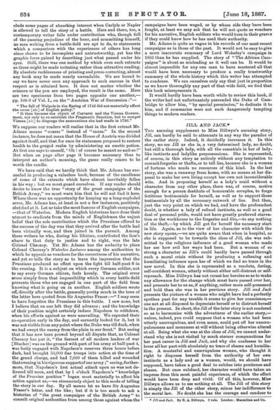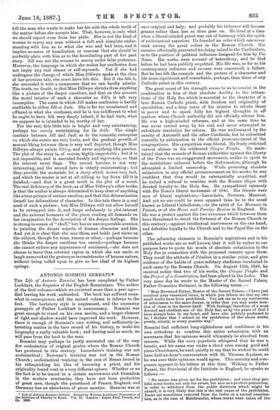JILL AND JACK.*
This amusing supplement to Miss Dillwyn's amusing story, Jill, can hardly be said to attenuate in any way the paradox of the earlier story. Indeed, it decidedly increases it. In this story, we see Jill as she is, a very determined lady, no doubt, but still a thorough lady, with all the essentials in her of lady- like instincts and ladylike prepossessions. She is represented, of course, in this story as entirely without any temptation to commitforgeries or thefts, or to tell lies, because she is a woman of fortune who needs no resources of this kind. In the last story, she was a runaway from home, with no means at her dis- posal to make her own living except her own not inconsiderable wits. And in proposing herself as a lady's maid without a character from any other place, there was, of course, motive enough for a person destitute of honourable scruples, to forge fictitious testimonials for herself, as well as to support those testimonials by all the necessary outwork of lies. But then, just the very point on which we had, and have the profoundest doubt, is whether a lady of refined instincts, as well as a good deal of personal pride, would not have greatly preferred starva- tion or the workhouse to the forgeries and fibs,—to say nothing of the theft,—by which Jill got for herself the necessary start in life. Again, as to the view of her character with which the new story opens,—we are quite aware that when in hospital, as she is supposed to be towards the close of Jill, she was sub- mitted to the religions influence of a good woman who made her see how evil her ways had been. But a woman of so strong a character as Jill's could hardly have paused through such a moral crisis without its producing a softening and humiliating influence upon her of which we find no trace in the new noveL In this she is represented as a resolute, daring, self-confident woman, utterly without either self-distrust or self- reproach. Miss Dillwyn has not recast her heroine so as to make any allowance for the change which must have passed over her, and presents her tons as, if anything, rather more self-possessed and bold than she was in her previous story. Jill and Jack presents the picture of a woman who might have had a perfectly spotless past for any trouble it seems to give her conscience,— one not at all disposed to depreciate herself or to distrust herself in the present. In short, the Jill of the later story is not rendered so as to harmonise with the adventures of the earlier story,— unless, indeed, you could suppose that a woman who had been utterly unscrupulous, and even mean, could pat off her unscru- pulousness and meanness at will without being otherwise altered at all. Being what she was at the close of Jill, we cannot under- stand why she is not visited by much sterner compunctions for her past career in All and Jack, and why she confesses to her lover all her past with absolutely no trace of shame and humilia- tion. A masterful and unscrupulous woman, who thought it right to dispense herself from the authority of her own instincts as a lady and as a woman, would, we should have supposed, have taken a good deal to subdue into penitence and shame. But once subdued, her character would have taken an impress from this most painful experience, of which the effect would have been deep and vivid. Of all this, however, Miss Dillwyn allows us to see nothing at all. The Jill of this story is simply the Jill of the other story, minus her indifference to the moral law. No doubt she has the courage and candour to • Jut and .Tack. By E.d. Dillwyn. 2 yob. London Macmillan sad Co.
tell the man who wants to make her his wife the whole truth of the matter before she accepts him. That, however, is only what we should expect even from her pride. She is not the kind of woman to marry any man without a full and complete under- standing with him as to what she was and had been, and it implies no sense of humiliation or remorse that she should be perfectly plain with him as to the humiliating part of her past story. Jill was not the woman to marry under false pretences. Moreover, the language in which she makes her confession does not imply any real shame or self-reproach. Yet if she had undergone the change of which Miss Dillwyn spoke at the close of her previous tale, she must have felt this. But if she felt it, she concealed it with a composure that we can hardly admire. The truth, no doubt, is that Miss Dillwyn shrinks from anything like a picture of the deeper emotions, and that on this account the moral interior of such a character as Jill's is left very incomplete. The scene in which Jill makes confession is hardly creditable to either Jill or Jack. She is far too unashamed and offhand in what she confesses, and he is too indifferent to what he ought to have felt very deeply indeed, if he had been, what we suppose he is intended to be, worthy of her.
For the rest, this little tale is bright and very entertaining, perhaps too merely entertaining for its drift. The single combats between Jill and Jack as to the romantic enterprise on which she enters are very lively, and the gradual growth of mutual liking between them is very well depicted, though Miss Dillwyn always paints liking, and never anything like passion. The plot of the story is, of course, highly improbable, but it is not impossible, and is narrated freshly and vigorously, so that the interest never flags. The second heroine is not very interesting, and the second hero is utterly uninteresting ; but they provide the materials for a story which moves very fast, and which the reader is not at all willing to lay down till it is finished,—and that is a great merit in the plot of a novel. The real deficiency of the book, as of Miss Dillwyn's other books, is that the author is always determined to keep clear of anything like a true picture of serious emotion, and that this determination dwarfs her delineations of character. In this tale there is a real need of such a picture ; but Miss Dillwyn will not allow herself to be entrapped into it, and keeps sedulously to plot-interest and the external humours of the piece, evading all demands on her imagination for the description of the deeper feelings. She is strong in scenes of "chaff," but has an unconquerable aversion to painting the deeper aspects of human character and fate. And yet it is clear that she sees them, and holds just views on the subject, though for some reason or other,—perhaps because she thinks the deeper emotions too sacred,—perhaps because she cannot endure any appearance of sentiment,—she does not choose to leave that external region in which she can smile or laugh unmoved at the grotesque inconsistencies of human nature, without being called upon to give us her ideal of its highest springs.



































 Previous page
Previous page